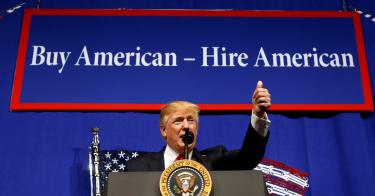Today, President Trump signed an executive order that targets a visa program used to hire high-skilled foreign workers. The H-1B visa program has been an important tool for many businesses looking to fill critical vacancies when there is a skill shortage.
However, the mechanism for assigning the visas threatens to turn the program into something better described as “Mega Minions” — a lottery where lucky employers get to bring in workers whose skill set isn’t that rare but will work for lower wages.
Silicon Valley is the classic case where an infusion of high-skilled, entrepreneurial immigrants accelerated the innovation that led to phenomenal wealth and job creation. The intent of the H-1B visa program is to support this sort of employment-expanding enhancement of our national skill set.
Unfortunately, H-1B visas are now allocated by random chance as opposed to greatest need or highest skill. Even the program’s most ardent supporters have to admit this glaring weakness. It means that the application from an employer looking to save a buck an hour by getting a foreign mid-level technician has the same odds of winning a visa as the employer who needs a highly specialized engineer to develop a potentially game-changing technology. This does not make sense.
Let’s hope the “Hire American” part of the president’s executive order starts the process to fix this problem instead of a process that applies a blanket reduction in the availability of the visas. The fix, here, can be quite simple: replace the visa lottery with a visa auction.
Of course, in Washington, simple and easy are not the same things. We can expect the big winners in the current lottery scheme to lobby for the free visa program. Everybody else should prefer the far more efficient auction approach.
An auction would have at least two advantages. First, it would allow businesses that have the hardest time finding existing residents to fill their jobs to move to the front of the line. If the foreign employee they have identified really is that critical, they will be willing to pay more than a firm that only seeks to get a more generic employee on the cheap. Second, it provides a measure of how much value an additional high-skilled worker is worth.
Right now we only have indirect measures of the benefit of H-1B workers. With a visa auction, there would be price, and that price could help guide policy as to whether there are too few or too many visas each year.
To get some idea of just how inane the current lottery system is, one needs only to look at how quickly the visa applications surpass the allowed quota. For the last several years, the visas were exhausted within five days of the opening date for submitting applications. In fact, for the 2017 fiscal year, 236,000 applications were received in the first five days — and there were only 85,000 visas available for the whole year.
And, because the process is random, there is no mechanism for assuring that the 85,000 visas go to those positions that would add the greatest value to our economy. Instead, it appears that those companies best able to game the application process get the most visas.
Whatever the quota is, these specialized visas should be allocated in a way that provides the greatest benefit. A price system is how businesses compete for office furniture, printing supplies, computers, and everything else. There is every reason to think it should also be used for the H-1B visas.
Saying that all immigration kills jobs for those who are already here simply does not comport with America’s history. The market for skills and abilities is international. It is foolish to pretend that we cannot benefit from bringing the most creative and ambitious people to the United States. It is even more foolish to think that we can identify the most creative and ambitious by flipping coins.
This piece originally appeared in The Hill on 4/18/17



